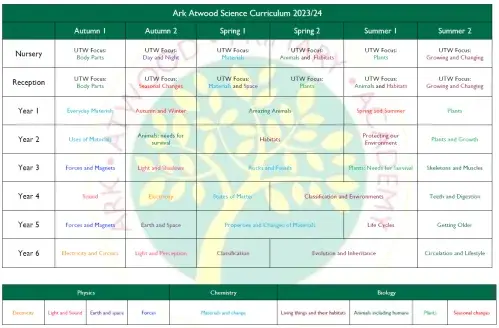Science
Science is an engaging, inquiry-led subject that aims to ensure pupils are equipped to understand the uses and implications of science today and in the future. Science is both a process and a body of knowledge. It can be used to explain what is occurring, predict how things will behave and analyse causes. A carefully thought-out Science curriculum equips pupils with the knowledge and skills to understand the material world as well as the uses and implications of Science today and in the future.
What is our approach to Science?
Our intent is to nurture children’s natural curiosity and allow them to develop a strong understanding of the world around them, acquiring specific skills and knowledge to help them to think and work scientifically. Our curriculum gives children an understanding of scientific concepts and processes, providing the foundations for understanding the world through the specific disciplines of biology, chemistry and physics.
What does our approach to Science look like in the classroom?
We believe that skills and knowledge are intrinsically linked in the Science curriculum and aim to capitalise on this by sequencing our curriculum content in a way that allows children to revisit and build upon existing knowledge and skills from previous years.
During lessons, children participate in a wide range of activities that are practical, relevant, collaborative and engaging. We aim to give them an understanding of scientific concepts and processes. This includes asking questions, discussing, predicting and planning investigations as well as methods of recording, interpreting and evaluating findings.
Children in EYFS learn about the similarities and differences in relation to places, objects, materials and living things. Teachers facilitate children’s curiosity through questioning and engaging, varied learning experiences.
In Key Stage 1, children continue to build on their science knowledge with more formal weekly science lessons where they are taught to use the following practical scientific methods, processes and skills: asking simple questions and recognising that they can be answered in different ways; observing closely, using simple equipment; performing simple tests; identifying and classifying; using their observations and ideas to suggest answers to questions and gathering and recording data to help in answering questions.
In Key Stage 2, children develop a deeper understanding of a wide range of scientific ideas through exploring and talking about their ideas; asking their own questions about scientific phenomena; and analysing functions, relationships and interactions more systematically. They encounter more abstract ideas and begin to recognise how these ideas help them to understand and predict how the world operates. They will also begin to recognise that scientific ideas change and develop over time. They will select the most appropriate ways to answer science questions using different types of scientific enquiry, including observing changes over different periods of time, noticing patterns, grouping and classifying things, carrying out comparative and fair tests and finding things out using a wide range of secondary sources of information. Pupils will reflect on their learning to draw conclusions based on their data and observations, use evidence to justify their ideas, and use their scientific knowledge and understanding to explain their findings.
How do we measure success in Science?
The Science curriculum will make a profound and positive impact on the outcomes of every child. The structure enables us to return to core knowledge and skills throughout the course, embedding key practises and understanding.
Core knowledge of each unit is supported by a Knowledge Organiser which details the key learning points, vocabulary and key questions. Memory Workouts are used to gauge knowledge retention throughout. In line with the Ark Assessment policy, children sit a summative test at the end of each year.
We endeavour to create strong and appropriate links with other subjects to enhance the curriculum and learning experience, predominantly but not exclusively with Maths, Literacy, Music, PSHE, Humanities and PE.
Our teachers rely on a range of assessment tools to provide data on the knowledge and skills pupils have, their progress and their development points.
This includes:
- formative assessment during lessons
- record of learning in books
- summative assessments
- pupil voice
- Image

